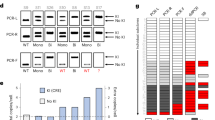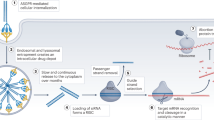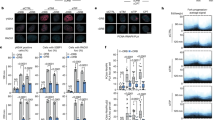Abstract
Activation-induced cytidine deaminase (AID) is involved in somatic DNA alterations of the immunoglobulin gene for amplification of immune diversity. The fact that constitutive expression of AID in mice causes tumors in various organs, including lymphoid tissues and lungs, suggests the important role of the aberrant editing activity of AID on various tumor-related genes for carcinogenesis. AID expression, however, is restricted to activated B cells under physiological conditions. We demonstrate here that ectopic AID expression is induced in response to tumor necrosis factor-α stimulation in cultured human hepatocytes. The proinflammatory cytokine-mediated expression of AID is achieved by IκB kinase-dependent nuclear factor (NF)-κB signaling pathways. Hepatitis C virus, one of the leading causes of hepatocellular carcinoma (HCC), enhanced AID expression via NF-κB activation through expression of viral core protein. The aberrant expression of AID in hepatoma-derived cells resulted in accumulation of genetic alterations in the c-myc and pim1 genes, suggesting that inappropriate expression of AID acts as a DNA mutator that enhances the genetic susceptibility to mutagenesis in human hepatocytes. Our current findings indicate that the inappropriate expression of AID is induced by proinflammatory cytokine stimulation and may provide the link between hepatic inflammation and the development of HCC.
This is a preview of subscription content, access via your institution
Access options
Subscribe to this journal
Receive 50 print issues and online access
$259.00 per year
only $5.18 per issue
Buy this article
- Purchase on Springer Link
- Instant access to full article PDF
Prices may be subject to local taxes which are calculated during checkout





Similar content being viewed by others
References
Aly HH, Watashi K, Hijikata M, Kaneko H, Takada Y, Egawa H et al. (2007). Serum-derived hepatitis C virus infectivity in interferon regulatory factor-7-suppressed human primary hepatocytes. J Hepatol 46: 26–36.
Balkwill F, Mantovani A . (2001). Inflammation and cancer: back to Virchow? Lancet 357: 539–545.
Coulouarn C, Gomez-Quiroz LE, Lee JS, Kaposi-Novak P, Conner EA, Goldina TA et al. (2006). Oncogene-specific gene expression signatures at preneoplastic stage in mice define distinct mechanisms of hepatocarcinogenesis. Hepatology 44: 1003–1011.
Coussens LM, Werb Z . (2002). Inflammation and cancer. Nature 420: 860–867.
Dedeoglu F, Horwitz B, Chaudhuri J, Alt FW, Geha RS . (2004). Induction of activation-induced cytidine deaminase gene expression by IL-4 and CD40 ligation is dependent on STAT6 and NFkappaB. Int Immunol 16: 395–404.
Doi T, Kinoshita K, Ikegawa M, Muramatsu M, Honjo T . (2003). De novo protein synthesis is required for the activation-induced cytidine deaminase function in class-switch recombination. Proc Natl Acad Sci USA 100: 2634–2638.
Feitelson MA . (2006). Parallel epigenetic and genetic changes in the pathogenesis of hepatitis virus-associated hepatocellular carcinoma. Cancer Lett 239: 10–20.
Gonzalez-Amaro R, Garcia-Monzon C, Garcia-Buey L, Moreno-Otero R, Alonso JL, Yague E et al. (1994). Induction of tumor necrosis factor alpha production by human hepatocytes in chronic viral hepatitis. J Exp Med 179: 841–848.
Greeve J, Philipsen A, Krause K, Klapper W, Heidorn K, Castle BE et al. (2003). Expression of activation-induced cytidine deaminase in human B-cell non-Hodgkin lymphomas. Blood 101: 3574–3580.
Greten FR, Eckmann L, Greten TF, Park JM, Li ZW, Egan LJ et al. (2004). IKKbeta links inflammation and tumorigenesis in a mouse model of colitis-associated cancer. Cell 118: 285–296.
Heintel D, Kroemer E, Kienle D, Schwarzinger I, Gleiss A, Schwarzmeier J et al. (2004). High expression of activation-induced cytidine deaminase (AID) mRNA is associated with unmutated IGVH gene status and unfavourable cytogenetic aberrations in patients with chronic lymphocytic leukaemia. Leukemia 18: 756–762.
Honjo T, Kinoshita K, Muramatsu M . (2002). Molecular mechanism of class switch recombination: linkage with somatic hypermutation. Annu Rev Immunol 20: 165–196.
Ishii N, Watashi K, Hishiki T, Goto K, Inoue D, Hijikata M et al. (2006). Diverse effects of cyclosporine on hepatitis C virus strain replication. J Virol 80: 4510–4520.
Karin M, Greten FR . (2005). NF-kappaB: linking inflammation and immunity to cancer development and progression. Nat Rev Immunol 5: 749–759.
Kinoshita K, Honjo T . (2001). Linking class-switch recombination with somatic hypermutation. Nat Rev Mol Cell Biol 2: 493–503.
Kinoshita K, Nonaka T . (2006). The dark side of activation-induced cytidine deaminase: relationship with leukemia and beyond. Int J Hematol 83: 201–207.
Kotani A, Okazaki IM, Muramatsu M, Kinoshita K, Begum NA, Nakajima T et al. (2005). A target selection of somatic hypermutations is regulated similarly between T and B cells upon activation-induced cytidine deaminase expression. Proc Natl Acad Sci USA 102: 4506–4511.
Kou T, Marusawa H, Kinoshita K, Endo Y, Okazaki IM, Ueda Y et al. (2007). Expression of activation-induced cytidine deaminase in human hepatocytes during hepatocarcinogenesis. Int J Cancer 120: 469–476.
Lengauer C, Kinzler KW, Vogelstein B . (1998). Genetic instabilities in human cancers. Nature 396: 643–649.
Loeb LA, Loeb KR, Anderson JP . (2003). Multiple mutations and cancer. Proc Natl Acad Sci USA 100: 776–781.
Machida K, Cheng KT, Sung VM, Shimodaira S, Lindsay KL, Levine AM et al. (2004). Hepatitis C virus induces a mutator phenotype: enhanced mutations of immunoglobulin and protooncogenes. Proc Natl Acad Sci USA 101: 4262–4267.
Martin A, Bardwell PD, Woo CJ, Fan M, Shulman MJ, Scharff MD . (2002). Activation-induced cytidine deaminase turns on somatic hypermutation in hybridomas. Nature 415: 802–806.
Martin A, Scharff MD . (2002). Somatic hypermutation of the AID transgene in B and non-B cells. Proc Natl Acad Sci USA 99: 12304–12308.
Marusawa H, Hijikata M, Chiba T, Shimotohno K . (1999). Hepatitis C virus core protein inhibits Fas- and tumor necrosis factor alpha-mediated apoptosis via NF-kappaB activation. J Virol 73: 4713–4720.
Marusawa H, Hijikata M, Watashi K, Chiba T, Shimotohno K . (2001). Regulation of Fas-mediated apoptosis by NF-kappaB activity in human hepatocyte derived cell lines. Microbiol Immunol 45: 483–489.
Marusawa H, Uemoto S, Hijikata M, Ueda Y, Tanaka K, Shimotohno K et al. (2000). Latent hepatitis B virus infection in healthy individuals with antibodies to hepatitis B core antigen. Hepatology 31: 488–495.
Matsumoto T, Marusawa H, Endo Y, Ueda Y, Matsumoto Y, Chiba T . (2006). Expression of APOBEC2 is transcriptionally regulated by NF-kappaB in human hepatocytes. FEBS Lett 580: 731–735.
Murakami H, Sanderson ND, Nagy P, Marino PA, Merlino G, Thorgeirsson SS . (1993). Transgenic mouse model for synergistic effects of nuclear oncogenes and growth factors in tumorigenesis: interaction of c-myc and transforming growth factor alpha in hepatic oncogenesis. Cancer Res 53: 1719–1723.
Muramatsu M, Kinoshita K, Fagarasan S, Yamada S, Shinkai Y, Honjo T . (2000). Class switch recombination and hypermutation require activation-induced cytidine deaminase (AID), a potential RNA editing enzyme. Cell 102: 553–563.
Muramatsu M, Sankaranand VS, Anant S, Sugai M, Kinoshita K, Davidson NO et al. (1999). Specific expression of activation-induced cytidine deaminase (AID), a novel member of the RNA-editing deaminase family in germinal center B cells. J Biol Chem 274: 18470–18476.
Okazaki IM, Hiai H, Kakazu N, Yamada S, Muramatsu M, Kinoshita K et al. (2003). Constitutive expression of AID leads to tumorigenesis. J Exp Med 197: 1173–1181.
Okazaki IM, Kinoshita K, Muramatsu M, Yoshikawa K, Honjo T . (2002). The AID enzyme induces class switch recombination in fibroblasts. Nature 416: 340–345.
Pahl HL . (1999). Activators and target genes of Rel/NF-kappaB transcription factors. Oncogene 18: 6853–6866.
Pelengaris S, Khan M, Evan G . (2002). c-MYC: more than just a matter of life and death. Nat Rev Cancer 2: 764–776.
Pikarsky E, Porat RM, Stein I, Abramovitch R, Amit S, Kasem S et al. (2004). NF-kappaB functions as a tumour promoter in inflammation-associated cancer. Nature 431: 461–466.
Revy P, Muto T, Levy Y, Geissmann F, Plebani A, Sanal O et al. (2000). Activation-induced cytidine deaminase (AID) deficiency causes the autosomal recessive form of the Hyper-IgM syndrome (HIGM2). Cell 102: 565–575.
Ta VT, Nagaoka H, Catalan N, Durandy A, Fischer A, Imai K et al. (2003). AID mutant analyses indicate requirement for class-switch-specific cofactors. Nat Immunol 4: 843–848.
Tanaka Y, Marusawa H, Seno H, Matsumoto Y, Ueda Y, Kodama Y et al. (2006). Anti-viral protein APOBEC3G is induced by interferon-alpha stimulation in human hepatocytes. Biochem Biophys Res Commun 341: 314–319.
Tateno C, Takai-Kajihara K, Yamasaki C, Sato H, Yoshizato K . (2000). Heterogeneity of growth potential of adult rat hepatocytes in vitro. Hepatology 31: 65–74.
Teng B, Burant CF, Davidson NO . (1993). Molecular cloning of an apolipoprotein B messenger RNA editing protein. Science 260: 1816–1819.
Thorgeirsson SS, Grisham JW . (2002). Molecular pathogenesis of human hepatocellular carcinoma. Nat Genet 31: 339–346.
Tilg H, Wilmer A, Vogel W, Herold M, Nolchen B, Judmaier G et al. (1992). Serum levels of cytokines in chronic liver diseases. Gastroenterology 103: 264–274.
Tsukuma H, Hiyama T, Tanaka S, Nakao M, Yabuuchi T, Kitamura T et al. (1993). Risk factors for hepatocellular carcinoma among patients with chronic liver disease. N Engl J Med 328: 1797–1801.
Yoshikawa K, Okazaki IM, Eto T, Kinoshita K, Muramatsu M, Nagaoka H et al. (2002). AID enzyme-induced hypermutation in an actively transcribed gene in fibroblasts. Science 296: 2033–2036.
Acknowledgements
We are grateful to Y Ueda for his useful suggestions and critical reading of the paper, Y Matsumoto for helpful advice and T Kou for help with the analyses on Tg mice. This study was supported by a grant in aid for Scientific Research (15209024, 16790378 and 17002015) from the Japan Society for the Promotion of Science (JSPS).
Author information
Authors and Affiliations
Corresponding author
Additional information
Supplementary Information accompanies the paper on the Oncogene website (http://www.nature.com/onc).
Supplementary information
Rights and permissions
About this article
Cite this article
Endo, Y., Marusawa, H., Kinoshita, K. et al. Expression of activation-induced cytidine deaminase in human hepatocytes via NF-κB signaling. Oncogene 26, 5587–5595 (2007). https://doi.org/10.1038/sj.onc.1210344
Received:
Revised:
Accepted:
Published:
Issue Date:
DOI: https://doi.org/10.1038/sj.onc.1210344
Keywords
This article is cited by
-
Elevated expression of the colony-stimulating factor 1 (CSF1) induces prostatic intraepithelial neoplasia dependent of epithelial-Gp130
Oncogene (2022)
-
Mutational signatures and processes in hepatobiliary cancers
Nature Reviews Gastroenterology & Hepatology (2022)
-
Immunomodulatory effects of thalidomide in an experimental brain death liver donor model
Scientific Reports (2021)
-
Up-regulation of activation-induced cytidine deaminase and its strong expression in extra-germinal centres in IgG4-related disease
Scientific Reports (2019)
-
Expression and subcellular localisation of AID and APOBEC3 in adenoid and palatine tonsils
Scientific Reports (2018)



